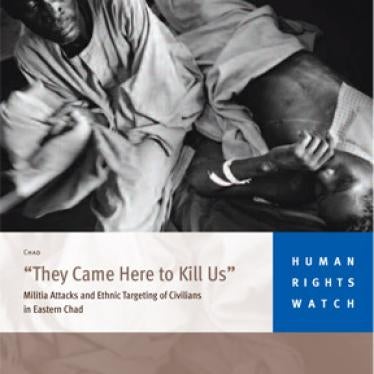(New York)- Chadian and Sudanese militias and other armed groups are committing serious human rights abuses against civilians in eastern Chad, and the Chadian government must do more to protect civilians from such abuses, Human Rights Watch said in a report released today. The UN Security Council will meet on January 10 to discuss deployment of an international security force to eastern Chad and the northern Central African Republic.
The 70-page report, “They Came Here to Kill Us: Militia Attacks and Ethnic Targeting of Civilians in Eastern Chad,” documents a drastic deterioration in the human rights situation in eastern Chad, where more than 300 civilians were killed and at least 17,000 people displaced in militia violence in November alone. In most instances, civilians were targeted on the basis of ethnic identity. The Chadian government, preoccupied with quashing rebel insurgents, has not only failed to protect civilians, but is contributing to the cycle of violence by supporting certain abusive armed groups.
Human Rights Watch called on the Security Council to authorize a deployment of international military personnel and human rights monitors to eastern Chad to: protect and deter further attacks on civilians; monitor the Chad/Sudan border; and publicly report on cross-border attacks on civilians and the movement of armed groups in the border zone, including Sudanese government-backed “Janjaweed” militias.
“Chad and Sudan are supporting rebel insurgencies on both sides of their border while militias rampage through eastern Chad and civilians are left to fend for themselves,” said Peter Takirambudde, Africa director at Human Rights Watch. “Chad is too busy fighting rebels to protect its own citizens, and may be making matters worse by supporting select militias.”
The Chadian government, which redeployed troops in response to threats from Chadian rebels based in Darfur and backed by the Sudanese government, has left a security vacuum along the border. This allows Janjaweed militias and other armed groups to carry out cross-border attacks against Chadian civilians. Subsequent government efforts to fill this security vacuum by supporting Sudanese rebels and other armed groups have exacerbated latent intercommunal tensions, but have failed to protect civilians.
In October and November 2006, more than 80 villages in eastern Chad were attacked and looted by Sudanese and Chadian militias. By 2007, more than 100,000 Chadians were internally displaced by a combination of cross-border raids and an increasing spiral of ethnic-targeting and militia attacks in Chadian communities. The majority of victims belonged to non-Arab ethnic groups, though there are significant exceptions, including a mid-October attack against a village in the Kerfi area, 45 kilometers south of Goz Beida, in which 17 Arab civilians were killed by a non-Arab self-defense militia based nearby.
“Militia attacks have polarized communities in eastern Chad, straining underlying ethnic tensions to the breaking point,” said Takirambudde. “Until some semblance of law and order is imposed along the Chad-Sudan border, there’s a real danger of widespread sectarian violence.”
Unable or unwilling to effectively protect civilians along the Chad-Sudan border, the Chadian government has permitted Sudanese rebels to operate freely from base camps in the region. They are carrying out recruitment in the local community and displaced persons camps, raising taxes and organizing village-based self-defense groups. One consequence of this security arrangement is that Chadian civilians have come to be associated with these Sudanese rebel groups by Arab militias active in the border zone, and were often accused of being rebels themselves during the recent attacks.
The Sudanese government continues to recruit and arm the Janjaweed militias as part of its counter-insurgency strategy in Darfur. Khartoum has yet to disarm these militias and prosecute them for war crimes and crimes against humanity committed in Darfur, despite a commitment to do so under UN resolutions. At least 200,000 people have died, and at least 2 million Sudanese civilians have been displaced by Sudanese government and Janjaweed attacks since early 2003.
“The United Nations has yet to deploy in Darfur, but at a minimum it can send a force to protect civilians in Chad and secure the border,” said Takirambudde. “Militia attacks in eastern Chad aren’t over; they’re part of a deteriorating pattern of violence.”
In a December 22, 2006 report on Chad and the Central African Republic, former UN Secretary-General Kofi Annan expressed reservations about deploying a UN protection force in view of the ongoing hostilities between Chadian rebels and the government of Chad. However, since that report was written, one of the main Chadian rebel groups signed a peace accord with the government of Chad, and other Chadian rebel groups are reportedly engaged in peace discussions with Chadian government officials.







